现在完成时讲解
现在完成时态讲解
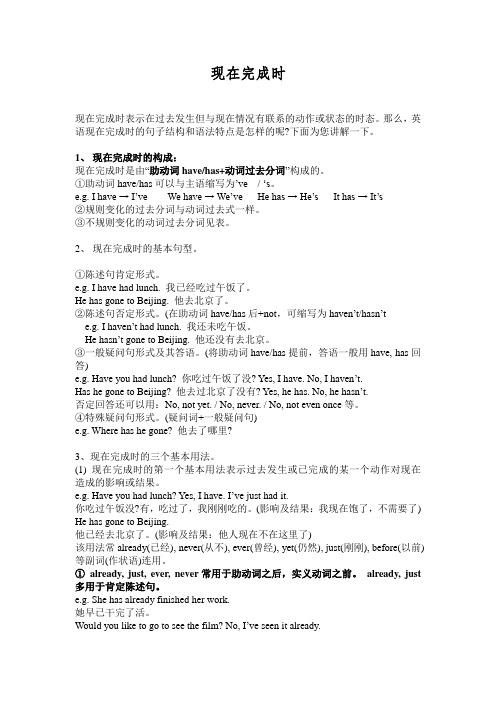
现在完成时现在完成时表示在过去发生但与现在情况有联系的动作或状态的时态。
那么,英语现在完成时的句子结构和语法特点是怎样的呢?下面为您讲解一下。
1、现在完成时的构成:现在完成时是由“助动词have/has+动词过去分词”构成的。
①助动词have/has可以与主语缩写为‟ve / …s。
e.g. I have → I‟ve We have → We‟ve He has → He‟s It has → It‟s②规则变化的过去分词与动词过去式一样。
③不规则变化的动词过去分词见表。
2、现在完成时的基本句型。
①陈述句肯定形式。
e.g. I have had lunch. 我已经吃过午饭了。
He has gone to Beijing. 他去北京了。
②陈述句否定形式。
(在助动词have/has后+not,可缩写为haven‟t/hasn‟te.g. I haven‟t had lunch. 我还未吃午饭。
He hasn‟t gone to Beijing. 他还没有去北京。
③一般疑问句形式及其答语。
(将助动词have/has提前,答语一般用have, has回答)e.g. Have you had lunch? 你吃过午饭了没? Yes, I have. No, I haven‟t.Has he gone to Beijing? 他去过北京了没有? Yes, he has. No, he hasn‟t.否定回答还可以用:No, not yet. / No, never. / No, not even once等。
④特殊疑问句形式。
(疑问词+一般疑问句)e.g. Where has he gone? 他去了哪里?3、现在完成时的三个基本用法。
(1) 现在完成时的第一个基本用法表示过去发生或已完成的某一个动作对现在造成的影响或结果。
e.g. Have you had lunch? Yes, I have. I‟ve just had it.你吃过午饭没?有,吃过了,我刚刚吃的。
现在完成时讲解
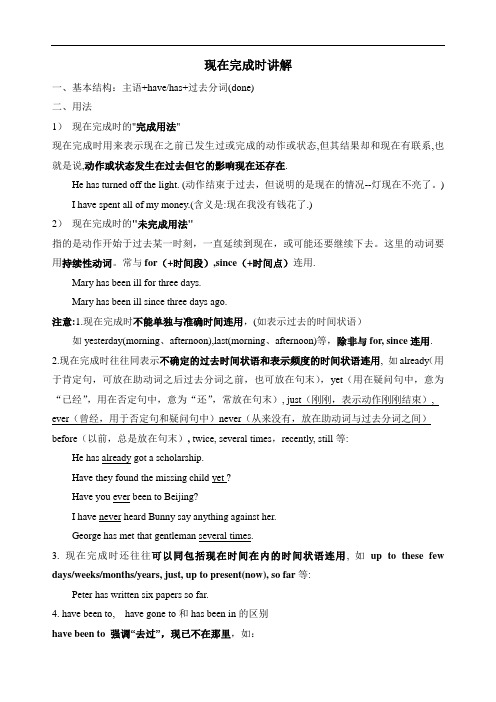
现在完成时讲解一、基本结构:主语+have/has+过去分词(done)二、用法1)现在完成时的"完成用法"现在完成时用来表示现在之前已发生过或完成的动作或状态,但其结果却和现在有联系,也就是说,动作或状态发生在过去但它的影响现在还存在.He has turned off the light. (动作结束于过去,但说明的是现在的情况--灯现在不亮了。
)I have spent all of my money.(含义是:现在我没有钱花了.)2)现在完成时的"未完成用法"指的是动作开始于过去某一时刻,一直延续到现在,或可能还要继续下去。
这里的动词要用持续性动词。
常与for(+时间段),since(+时间点)连用.Mary has been ill for three days.Mary has been ill since three days ago.注意:1.现在完成时不能单独与准确时间连用,(如表示过去的时间状语)如yesterday(morning、afternoon),last(morning、afternoon)等,除非与for, since连用. 2.现在完成时往往同表示不确定的过去时间状语和表示频度的时间状语连用, 如already(用于肯定句,可放在助动词之后过去分词之前,也可放在句末),yet(用在疑问句中,意为“已经”,用在否定句中,意为“还”,常放在句末), just(刚刚,表示动作刚刚结束), ever(曾经,用于否定句和疑问句中)never(从来没有,放在助动词与过去分词之间)before(以前,总是放在句末), twice, several times,recently, still等:He has already got a scholarship.Have they found the missing child yet ?Have you ever been to Beijing?I have never heard Bunny say anything against her.George has met that gentleman several times.3. 现在完成时还往往可以同包括现在时间在内的时间状语连用, 如up to these few days/weeks/months/years, just, up to present(now), so far等:Peter has written six papers so far.4. have been to, have gone to和has been in的区别have been to 强调“去过”,现已不在那里,如:have gone to主要强调的是“去了”,现在人不在说话的现场,has been in 一直在某地如:--Where's your mother? --She has gone to the hospital.He has been to the USA three times.他到美国去过三次。
现在完成时的用法讲解
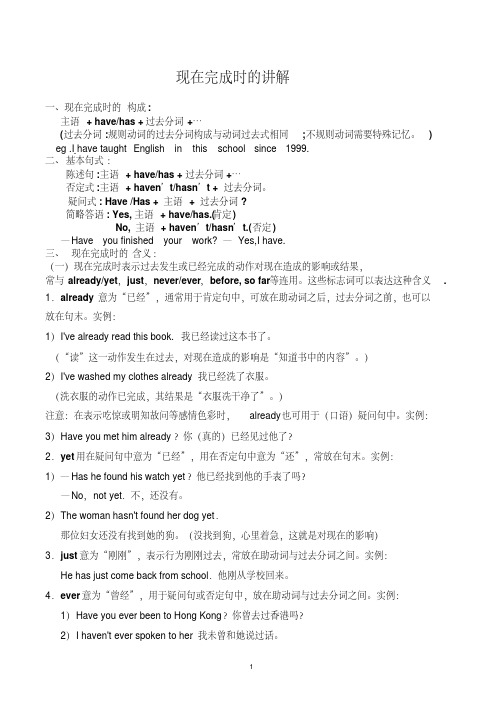
现在完成时的讲解一、现在完成时的构成:主语+ have/has + 过去分词+…(过去分词:规则动词的过去分词构成与动词过去式相同;不规则动词需要特殊记忆。
) eg .I have taught English in this school since 1999.二、基本句式:陈述句:主语+ have/has + 过去分词+…否定式:主语+ haven’t/hasn’t + 过去分词。
疑问式: Have /Has + 主语+ 过去分词?简略答语: Yes, 主语+ have/has.(肯定)No, 主语+ haven’t/hasn’t.(否定)—Have you finished your work? —Yes,I have.三、现在完成时的含义:(一)现在完成时表示过去发生或已经完成的动作对现在造成的影响或结果,常与already/yet,just,never/ever,before, so far等连用。
这些标志词可以表达这种含义. 1.already意为“已经”,通常用于肯定句中,可放在助动词之后,过去分词之前,也可以放在句末。
实例:1)I've already read this book. 我已经读过这本书了。
(“读”这一动作发生在过去,对现在造成的影响是“知道书中的内容”。
)2)I've washed my clothes already.我已经洗了衣服。
(洗衣服的动作已完成,其结果是“衣服冼干净了”。
)注意:在表示吃惊或明知故问等感情色彩时,already也可用于(口语)疑问句中。
实例:3)Have you met him already ?你(真的)已经见过他了?2.yet用在疑问句中意为“已经”,用在否定句中意为“还”,常放在句末。
实例:1)—Has he found his watch yet ?他已经找到他的手表了吗?—No,not yet.不,还没有。
2)The woman hasn't found her dog yet .那位妇女还没有找到她的狗。
现在完成时讲解
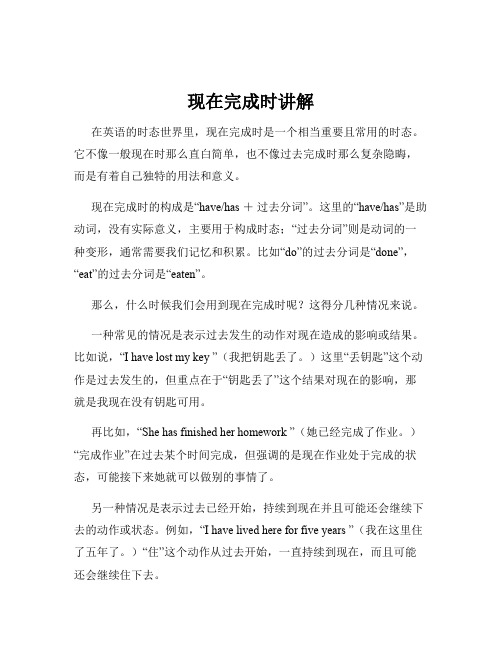
现在完成时讲解在英语的时态世界里,现在完成时是一个相当重要且常用的时态。
它不像一般现在时那么直白简单,也不像过去完成时那么复杂隐晦,而是有着自己独特的用法和意义。
现在完成时的构成是“have/has +过去分词”。
这里的“have/has”是助动词,没有实际意义,主要用于构成时态;“过去分词”则是动词的一种变形,通常需要我们记忆和积累。
比如“do”的过去分词是“done”,“eat”的过去分词是“eaten”。
那么,什么时候我们会用到现在完成时呢?这得分几种情况来说。
一种常见的情况是表示过去发生的动作对现在造成的影响或结果。
比如说,“I have lost my key ”(我把钥匙丢了。
)这里“丢钥匙”这个动作是过去发生的,但重点在于“钥匙丢了”这个结果对现在的影响,那就是我现在没有钥匙可用。
再比如,“She has finished her homework ”(她已经完成了作业。
)“完成作业”在过去某个时间完成,但强调的是现在作业处于完成的状态,可能接下来她就可以做别的事情了。
另一种情况是表示过去已经开始,持续到现在并且可能还会继续下去的动作或状态。
例如,“I have lived here for five years ”(我在这里住了五年了。
)“住”这个动作从过去开始,一直持续到现在,而且可能还会继续住下去。
还有,现在完成时常常和一些时间状语连用,来更明确地表达时间概念。
比如“already”(已经),通常用于肯定句中,位置一般在“have/has”和过去分词之间。
像“He has already gone ”(他已经走了。
)“yet”(还,尚未)则常用于否定句和疑问句中,在否定句中通常放在“have/has”和过去分词之后,比如“She hasn't finished her work yet ”(她还没有完成工作。
)在疑问句中,“yet”一般放在句末,例如“Have you finished your homework yet? ”(你作业做完了吗?)“just”(刚刚),表示刚刚完成的动作,位置也是在“have/has”和过去分词之间,比如“I have just come back ”(我刚刚回来。
现在完成时-语法讲解

语法:现在完成时1、现在完成时的定义:现在完成时表示动作发生在过去,但与现在情况有联系有影响,一个发生在过去的动作来说明现在的情况。
2、现在完成时的谓语构成:助动词have/has + 动词的过去分词3、常用时间状语:(1)与包括“现在”在内的时间状语连用,如:by now(到现在为止), so far(迄今为止), these days(这些天来), this year, this month, today, in the past few years(在过去的几年以来)等;e.g.We have planted many flowers this year.China has changed a lot in the past few years.I have learned two thousand words so far(by now).It has rained these days.(2)与副词连用,如:just, before, already,never,ever,yet,Recently,since, for等e.g. Have you ever watched Harry Potter?The new book have not arrived yet.Have you heard from him yet?They have already finished their homework.I have never seen an alien.He has just come.We have seen the movie before.My mother has worked here since 1949.I have taught English in this school for six years.4、用法:(1)表示过去发生的或已完成的某一动作对现在造成的影响或结果。
现在完成时语法总结讲解
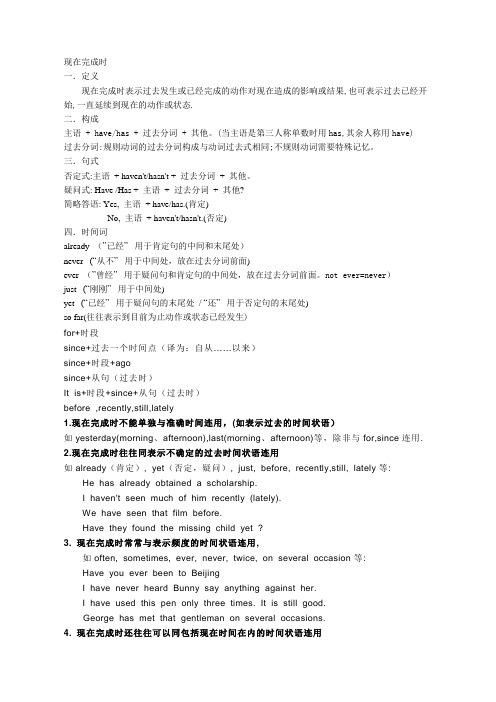
现在完成时一.定义现在完成时表示过去发生或已经完成的动作对现在造成的影响或结果,也可表示过去已经开始,一直延续到现在的动作或状态.二.构成主语 + have/has + 过去分词 + 其他。
(当主语是第三人称单数时用has,其余人称用have) 过去分词:规则动词的过去分词构成与动词过去式相同;不规则动词需要特殊记忆。
三.句式否定式:主语+ haven't/hasn't + 过去分词+ 其他。
疑问式: Have /Has + 主语+ 过去分词+ 其他?简略答语: Yes, 主语+ have/has.(肯定)No, 主语+ haven't/hasn't.(否定)四.时间词already (”已经”用于肯定句的中间和末尾处)never (“从不”用于中间处,放在过去分词前面)ever (”曾经”用于疑问句和肯定句的中间处,放在过去分词前面。
not ever=never)just (“刚刚”用于中间处)yet (“已经”用于疑问句的末尾处/ “还”用于否定句的末尾处)so far(往往表示到目前为止动作或状态已经发生)for+时段since+过去一个时间点(译为:自从……以来)since+时段+agosince+从句(过去时)It is+时段+since+从句(过去时)before ,recently,still,lately1.现在完成时不能单独与准确时间连用,(如表示过去的时间状语)如yesterday(morning、afternoon),last(morning、afternoon)等,除非与for,since连用.2.现在完成时往往同表示不确定的过去时间状语连用如already(肯定), yet(否定,疑问), just, before, recently,still, lately等: He has already obtained a scholarship.I haven't seen much of him recently (lately).We have seen that film before.Have they found the missing child yet ?3. 现在完成时常常与表示频度的时间状语连用,如often, sometimes, ever, never, twice, on several occasion等:Have you ever been to BeijingI have never heard Bunny say anything against her.I have used this pen only three times. It is still good.George has met that gentleman on several occasions.4. 现在完成时还往往可以同包括现在时间在内的时间状语连用如now, up to these few days/weeks/months/years, this morning/week/month/ year, just, today, up to present, so far等:Peter has written six papers so far.Man has now learned to release energy from the nucleus of the atom.There has been too much rain in San Francisco this year.The friendly relations and cooperation between our two countries have been enhanced in the past few years.Up to the present everything has been successful.5. 现在完成时还可以用来表示过去的一个时间到现在这段时间内重复发生的动作.We have had four texts this semester.have been to…表示“去过某地”(表示过去的经历,现在已经回来)have gone to…表示“去了某地”(表示出去了,还没有回来)。
初中英语现在完成时讲解全(共24张PPT)

I studied English ten years ago.
(come来到某地….
left the team
has been on C.
表示动作发生在过去,对现在造成的影响。
)
be over
went to bed
填空使用for和since
Tom ___for several hours.
表示动作发生在过去,对现在造成的影响。
• She has lived here ______1996.
• 2 标准词:so far/up to now (到目前为止) ;lately/recently(最近)
• Up to now/So far ,I haven’t been successful.
• Lately/Recently,I haven’t seen my teacher.
3. He bought the motorbike a month ago.
---He ____ ____ the motorbike for a month. 4. He arrived here three days ago.
--- He ____ ____ here since three days ago. 5. They turned off the light 2 hours ago.
(finish结束....)
be over
1.我买这本书三年了。Buy I have bought the book.
(1) I have had the book for 3 years. (2) I have had the book since 3 years ago.
了borrow He has borrow the book. (1)He has kept the book for 2 months . (2) He has kept the book since 2 months ago.
现在完成时讲解(详细、简单)
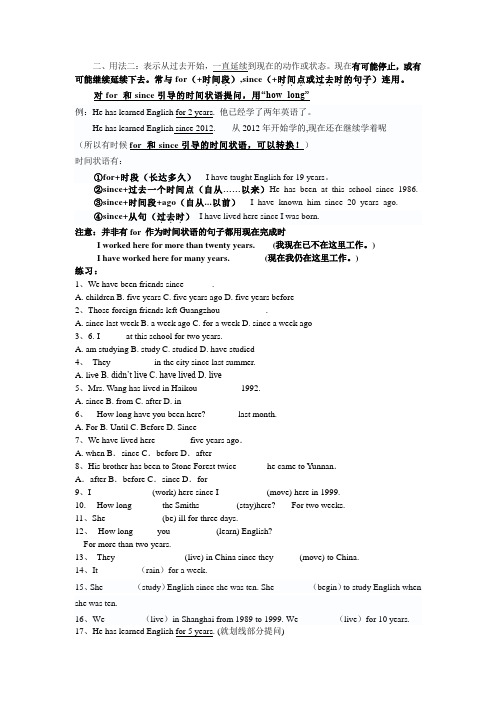
二、用法二:表示从过去开始,一直延续到现在的动作或状态。
现在有可能停止,或有可能继续延续下去。
常与for(+时间段...或过去时的句子......)连用。
...),since(+时间点对for 和since引导的时间状语提问,用“how long”例:He has learned English for 2 years. 他已经学了两年英语了。
He has learned English since 2012. -从2012年开始学的,现在还在继续学着呢(所以有时候for 和since引导的时间状语,可以转换!)时间状语有:①for+时段(长达多久)I have taught English for 19 years。
②since+过去一个时间点(自从……以来)He has been at this school since 1986.③since+时间段+ago(自从...以前)I have known him since 20 years ago.④since+从句(过去时...)I have lived here since I was born.注意:并非有for 作为时间状语的句子都用现在完成时I worked here for more than twenty years. (我现在已不在这里工作。
)I have worked here for many years.(现在我仍在这里工作。
)练习:1、We have been friends since ______.A. childrenB. five yearsC. five years agoD. five years before2、Those foreign friends left Guangzhou __________.A. since last weekB. a week agoC. for a weekD. since a week ago3、6. I _____ at this school for two years.A. am studyingB. studyC. studiedD. have studied4、They _________ in the city since last summer.A. liv eB. didn’t liveC. have livedD. live5、Mrs. Wang has lived in Haikou _________ 1992.A. sinceB. fromC. afterD. in6、---How long have you been here? --- ____ last month.A. ForB. UntilC. BeforeD. Since7、We have lived here _______ five years ago.A. when B.since C.before D.after8、His brother has been to Stone Forest twice ______ he came to Yunnan.A.after B.before C.since D.for9、I _____________ (work) here since I __________ (move) here in 1999.10. ---How long ______ the Smiths ________(stay)here? ---- For two weeks.11、She ____________ (be) ill for three days.12、--How long _____you __________(learn) English?---For more than two years.13、They _______________ (live) in China since they _____ (move) to China.14、It _______(rain)for a week.15、She _______(study)English since she was ten. She _______(begin)to study English when she was ten.16、We _______(live)in Shanghai from 1989 to 1999. We _______(live)for 10 years.17、He has learned English for 5 years. (就划线部分提问)________ ________ ________ _________ learned English ?18、We began to learn English three years ago.(改为同义句)We _______ _______ English ________ three years19、He has lived here since 1999.(就划线部分提问)_____ _____ _____ he_______ here?20、Mr. Li began to teach English in this school in 1999.(同义句)Mr. Li _______ _________ English in this school since 1999.21、The factory opened ten years ago.(同义句)The factory _______ ________ ______ for ten years.22、His company closed in 2003. (同义句)His company _____ _____ _____ _____ 2003.23、We got to know each other for about 15 years. (同义句)We _______ ________ each other _____ about 15 years.三、注意:在现在完成时中与for 和since引导的时间状语,how long连用的动词必须为延续性动词。
- 1、下载文档前请自行甄别文档内容的完整性,平台不提供额外的编辑、内容补充、找答案等附加服务。
- 2、"仅部分预览"的文档,不可在线预览部分如存在完整性等问题,可反馈申请退款(可完整预览的文档不适用该条件!)。
- 3、如文档侵犯您的权益,请联系客服反馈,我们会尽快为您处理(人工客服工作时间:9:00-18:30)。
have lived (live) in 8. The Greens _____________ this street since they _____ came (come) to Beijing. have taken (take) place 9. Great changes _________ in the last five years. 10. --Where’s Peter? gone (go) to Changzhou. -- He has _______
(4) She has left been away
since I came here .
现 在 完 成 时 (三 )
have (has ) been to +某地 have (has ) gone to +某地 去过某地 去了某地
1.Where is Jim ? I can’t find him . He has ______ gone to the school library .
3.一般疑问句 常与 ever 连用 (1) Have you ever done your work ? Yes, I have . No, I haven’t .
(2) Have they ever left ? Yes, they have. No, they haven’t. (3) Has he ever seen the film ? Yes, he has. No, he hasn’t.
carried worried tried cried
like live move
liked lived moved
现 在 完 成 时(一)
含义:
过去发生的动作对现在造成的影响或结果
I have done my homework .(写作业了)
He has planted trees .(植过树)
5. 自从半年前他就认识我。
He has known me since half a year ago .
6.自从我出生以来我就住这。
I have lived here since I was born .
7. 自从我们来到这就学英语。
We have studied English since we came here .
1.那本书他借三个星期了。 He has kept the book for 3 weeks . 2.他们来这半天了。 They have been here for half a day . 3.这辆车我已经买了半年了。
I have had the car since half a year ago .
2. A: Li Ming ’s house is very big .
B: How do you know that ?
A: I have _______ been to his house .
1. Have _____ you ________ found your bike yet? Yes, I found _____ it under the big tree an hour ago. (find) 2. _____ you ever ______ (be) to Sanya? Never. What about you? I ________________ (be) there twice. When _____ you _____ (go) there for the first time?
现 在 完 成 时(二)
含义:
过去已经开始,持续 到现在的动作或状态
(1)I have worked here for 11 years . (2) You have already studied here for 2 years. (3) He has lived there for 5 years .
Have
been
have been
did -- Last year.
go
3. My father _____ already ____________ (finish) mending myhas bike. finished
been (be) to the teachers’ 4. She has _____ just _____ office. have learned 5. So far we _________________ (learn) more than two thousand words. has happened 6. The picture shows what ___________ (happen) to the forests of the USA in the past 350 years.
时 态
1.现在进行时 S+be ( am, is, are ) + V.-ing 2.过去进行时 S+be ( was , were ) + V.-ing
3.一般将来时
4.一般现在时 5.一般过去时 6.现在完成时
S+will / be going to + V.
S+V, S+Ved S(三单)+V(s)
1. He has lived there since 1990. 2. I have already done the work since an hour ago . 3. They have worked in the factory since they came.
4.自从2004 年我们就在这学习。 We have studied here since 2004 .
S+have / has + V 肯定形式 have/has + done (P.P) 否定形式: have/has + not +done (P.P) 一般疑问句: Have/Has +主语+ done (P.P)
I have finished my homework. I haven’t finished my homework.
I have borrowed the book .(借了)
She has seen the film .(看过)
They have bought a car .(买了)
We have finished the work .(完成了)
现在完成时: 含义:….. 常与 already ,just 连用。 构成: have (has )+ V.过去分词 应用: 1. I have done my homework . have already ______ done my homework . (do) I _____ I ____________ have done my homework already . have just _______ done my homework . I _______ 2. 否定句 常与 yet ,never 连用 haven’t done my homework yet .(not do) I ______________ He _______ never _______ has seen this film. (see)
Have you finished your homework?
规则动词的过去分词
work visit ask play stay
worked visited asked played stayed
stop drop rob plan prefer
carry worry try cry
stopped dropped robbed planned preferred
4.他走了10天了。 He has been away for 10 days .
5. 我写完作业了。 I have finished my homework .
6. 我把房间打扫干净了。
I have cleaned my room.
7. 他把衣服洗了。
He has washed his clothes .
end /finish ---be over become --- be come/go/arrive /get/reach/move ---be in / at
改错:
(1)I have borrowed kept the book for 2 weeks .
(2) They have bought had the car since 2000.. (3) He has come been here for 5 minutes .
8. 我们吃过鱼。 We have eaten fish . 9. 他们来了。
They have come.
10. 她的书还了。 She has returned her book .
现在完成时
切记用法2的动词 仅限于延续性动词。 常见的非延续性动词(结束性动词) buy ---have borrow --- keep open ---be open close ---be closed leave ---be away die ---be dead join ---be a member begin ---be on
